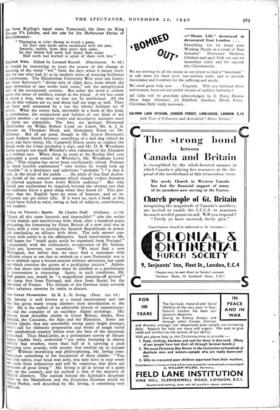English Wits. Edited by Leonard Russell. (Hutchinson. 8s. 6d.) Ir
would be interesting to trace the course of the change in meaning of the word " wit " from the days when it meant intel- ect (or one who had it) to its modern sense of amusing brilliance of expression. The Elizabethan University Wits were not funny; nor were Sylvester's "divine wits of elder days, from whom the jeep invention of rare works hath come," nor the metaphysical wits of the seventeenth centnry. But today the word is seldom given the sense of intellect, except in the plural. A wit has come to mean a wag, who may or may not be intellectual. All the wits in this volume are so, and about half are wags as well. They are here well annotated by a (on the whole) brilliant set of critics. What, the essays lack, inevitably in a book of this kind, is correlation, the comparison and balance of one kind of wit against another ; as separate essays and descriptive accounts most of them are admirable. The best are perhaps Desmond MacCarthy on Wilde, Robert Lynd on Lamb, Mr. A. J. A. Symons on Theodore Hook, and Monsignor Knox on Dr. Gilmour. But all are good, though in Mr. Ernest Newman's hands Sydney Smith becomes something of a dull dog (which he never can have been), Mr. Campbell Dixon seems to confuse the Rivals with the Critic (probably a slip), and Mr. D. B. Wyndham Lewis accepts too much Whistler's own valuation of the Islanders as a witless race. When those in court at the Ruskin libel case applauded a good remark of Whistler's, Mr. Wyndham Lewis adds, "This enigma has never been satisfactorily solved. Perhaps the most feasible explanation" (one wishes he would look up feasible" in a dictionary and substitute "probable ") "is that it took, in the mind of the public . . . the place of that final deafen- ing shriek of the concert soprano which ritually evokes thunders of relieved applause from every British audience." But why should any explanation be required, beyond the obvious one that the audience knew a good thing when they heard it? This pre- tence that the English have no sense of humour, and no in- telligence can get rather silly. If it were so, such a book as this would have failed to exist, owing to lack of subjects, contributors, and readers.


























































 Previous page
Previous page